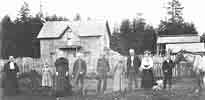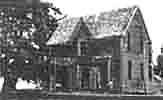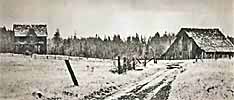






| Home |
| Early Life |
| Maps |
| Oregon Laws |
| The Trail |
| Bush Biography |
| Tumwater Born |
| Thurston County |
| State History |
| Bush
Farm Today |
| FAQs |
| Timeline |
|
Speeches of Sir Robert Peel - 1846 Sir,
if any thing could have induced me to regret
that decision on the part of the House,
which terminates the existence of the
government, it would have been the wish that
we should survive the day when intelligence
might be received from the United States as
to the result of our last attempt to adjust
the differences with that
country—differences which, unless speedily
terminated, must probably involve both
countries in the necessity of an appeal to
arms. The House will probably recollect
that, after we had offered to leave the
dispute respecting the territory of the
Oregon to arbitration, and that offer had
been rejected, the President of the United
States sent a message to the Congress, which
led
to discussions with regard to the
termination of the convention entered into
several years since, which provided for a
temporary adjustment of our differences—at
least, for a temporary avoidance of quarrel
—and enabled the two countries
jointly to occupy the territory of the
Oregon. The two Houses of the American
Congress, advised the President of the
United States to exercise his unquestionable
power, and to signify to this country the
desire of the United States to
terminate after the lapse of a year the
existing convention. They, however,
added to that advice, which might, perhaps,
otherwise have been considered
of an unsatisfactory or hostile character,
the declaration that they desired
the notice for the termination of the
convention to be given, in order that
an amicable adjustment of the dispute
between the two countries might thereby
be facilitated. It appeared to us, that the
addition of that conciliatory
declaration—the expression of a hope that
the termination of the convention
might the more strongly impress upon the two
countries the necessity of amicable
adjustment—removed any barrier which
diplomatic punctilios might have raised
to a renewal by this country of the attempt
to settle our differences with
the United States. We did not hesitate,
therefore, within two days after
the receipt of that intelligence—we did not
hesitate, although the offer
of arbitration made by us had been rejected,
to do that which, in the present
state of the protracted dispute, it became
essential to do—namely, not to
propose renewed and lengthened negotiations,
but to specify frankly and without
reserve, what were the terms on which we
could consent to a partition of
the country of the Oregon. Those who remember the
local conformation of that country will
understand that that which we proposed is
the continuation of the 49th parallel of
latitude, till it strikes the Straits of
Fuca; that that parallel should not be
continued as a boundary across Vancouver's
Island, thus depriving us of a part of
Vancouver's Island, but that the middle of
the channel shall be the future boundary,
thus leaving us in possession of the whole
of Vancouver's Island, with equal right to
the navigation of the Straits. Sir, the second article
of the convention we sent for the acceptance
of the United States was to this effect,
that—" From the point at which the 49th
parallel of north latitude shall be found to
intersect the great northern branch of the
Columbia river, the navigation of the said
branch shall be free and open to the
Hudson's Bay Company, and to all British
subjects trading with the same, to the point
where the said branch meets t he main stream
of the Columbia, and thence down the said
main stream to the ocean, with free access
into and through the said river or rivers,
it being understood that all the usual
portages along the line thus described,
shall in like manner be free and open. In
navigating the said river or rivers,
British subjects, with their goods and
produce, shall be treated on the same
footing' as citizens of the United States;
it being, however, always understood,
that nothing- in this article shall be
construed as preventing, or intended
to prevent, the government of the United
States from making any regulations
respecting the navigation of the said river,
or rivers, not inconsistent
with the present treaty." Washington, June 13,
1846. After a few hours deliberation on each of the three days, Wednesday, Thursday, and Friday, the senate, by a majority of 38 votes to 12, adopted yesterday evening a resolution advising the President to accept the terms proposed by her Majesty's government. The President did not hesitate to act on this advice, and Mr. Buchanan accordingly sent for me this morning, and informed me that the conditions offered by her Majesty's government were accepted by the government of the United States, without the addition or alteration of a single word.—I have the honour to be, &c. R. Pakenham.
" The Right Hon. the Earl of Aberdeen, K.
T., & c. |